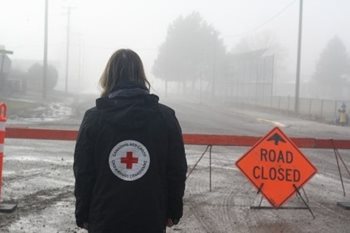By Vanessa Racine, social media coordinator
Floods can happen anywhere and at any time of the year. The key to staying safe is to prepare, have an
emergency plan in place, and know the flood risk in your community. It’s also important to take time to make sure your tenant insurance covers losses from flooding.
Here are some steps to take:
You can help protect yourself and your family from flooding. Download
this guide with steps you can take today.
- Get tenant insurance with flood coverage.
- Talk to your insurance provider about your risk and additional steps you can take to protect your home.
- Protect your valuables in waterproof containers. Place them above potential water levels.
- Buy or make an emergency kit, and keep it stocked. Families should be prepared to be self-sustaining for at least three days.
Renter’s Insurance or Tenant Insurance

Renter’s Insurance or Tenant Insurance protects you and your family from losses like fire, smoke, lightning, etc. Most insurance policies for renters will cover the personal property, additional living expenses and personal liability. Flood coverage is an extra option that may be available at an additional cost. Unfortunately, in some high-risk communities this type of insurance may not be available (or is only available at a very high cost). If you have purchased optional flood coverage, it can likely be found in the endorsement section of your policy.
If you live in a rented apartment, condo or house, your landlord’s insurance will not cover you in the event of a flood. This is a common misconception. In a disaster situation (flood, fire), tenants without insurance can often find themselves in need of temporary housing either because the building they were living in was destroyed or they were under an evacuation order. If your landlord has insurance, it will cover only the physical building and your landlord’s interests, not yours.
If you purchased optional flood or overland water coverage, it typically covers the additional costs you can incur if you are forced to evacuate your home. It may also cover the cost of a hotel or motel stay, usually for a specific length of time, as well as additional costs for food and clothing above and beyond what you would normally spend. For an overview of what your flood or overland water insurance will cover, be sure to talk to your insurance provider.
Cleanup
Cleanup costs may also be covered. Mold forms very easily, so very often, drywall must be torn out and carpets and floors lifted. Not only is mold smelly and unsightly, it also can be dangerous to your health. Mold coverage is excluded from most homeowners, condo owners and renter’s insurance polices – making it even more important to begin cleanup as soon as possible.
Your landlord’s insurance will typically pay for the clean up and repairs of the floors and walls. If you purchased optional flood coverage your insurer may cover the cost of cleaning up your personal property.
Contents Replacement
After a flood, your belongings can be very badly damaged or destroyed and may need to be replaced quickly. Your insurance company may provide you with a lump sum for your immediate, emergency needs, such as clothing, diapers, etc.
Important note: Be aware of the coverage limit for the policy you purchase. For example, if your flood coverage has a limit of $25,000 then this would be the maximum total amount that your insurance would pay out for cleanup and replacement of belongings, no matter how much you have lost. Ask your insurance representative how much flood coverage you have and discuss your options. Consider completing this
home inventory checklist to give you an idea how much you would be looking at to replace all of your contents.
Learn more about
insurance coverage for tenants affected by flooding.
Additional support
Disasters and emergencies can cause significant disruption and add stress to your life. If you experience stress reactions that make it impossible to function normally over a long period of time, seek help. One option is to contact your local health facility, or a local crisis support line.
For immediate assistance support anywhere in Canada, please call Crisis Services Canada at 1-833-456-4566.
Learn more about what to do
before, during and after floods.
Related stories: